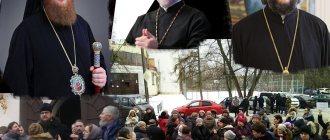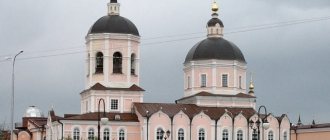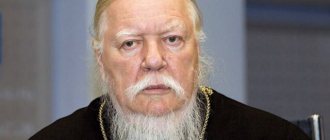Metropolitan Dimitri: “Everything in Siberia is done with love”
Metropolitan of Tobolsk and Tyumen
For so many years I have come to live with a constant sense of responsibility for the ministry that the church has entrusted to me
The most difficult thing for me in the interview with Metropolitan Dimitry of Tobolsk and Tyumen was to decide how it would be more correct and appropriate to address the interlocutor. After all, I wanted to talk to him not only about religious activities, but also simply as a person who probably has worldly—let’s call them that—memories, reflections, concerns...
I had to choose between Bishop Dimitri and Alexei Mikhailovich Kapalin - that’s what our Metropolitan was named at birth. Any online encyclopedia will tell you this. But what will he say himself?
“I’m still more accustomed to being addressed as Vladyka Dimitri.” To be honest, I don’t even remember who and when would call me by my worldly name. Even colleagues from the Moscow Institute of Transport Engineers, from which I graduated in 1974, address me according to my rank. And friends, too, actually. Unless in some official documents in brackets I am listed as Alexey Kapalin.
— Most often, they see you as a church official or just a person?
— For parishioners, most likely, first of all, I am a spiritual person. Even in those cases when they trust me with any innermost thoughts, they still perceive me as a minister of the church. In general, like any other person, I have a social circle, which includes people whom I have known for many years and with whom I communicate outside of church service. Although for so many years I have come to terms with a constant - no matter where I am and no matter what I do - sense of responsibility for the service that the church has entrusted to me. These are concerns for the flock, thoughts about the restoration and maintenance of churches, concern for counseling... Just recently we discussed with deputies the issue of supporting women who find themselves in difficult life situations. There are social institutions in the city and region that provide such support, but the administrative approach alone cannot fully solve the problem. In most cases, our consultation is required, because a person in trouble, as a rule, asks deep questions concerning the soul. And here the help of the church is needed.
— As far as I know, there have always been shelters at churches and monasteries that are ready to accept everyone who needs shelter and protection?
- Yes. Such a metochion exists, among other things, under the guardianship of our Tyumen Mother of God Nativity convent. Sometimes women find refuge there from husbands who offend them. Unfortunately, intrafamily conflicts are a common occurrence today. But this is a very great sin that destroys human souls. People may say that they love, but this is only in words, but in reality it is selfishness, oppression of those who are weaker. People forget about true selfless love, which is God's gift to us. She does not demand anything in return, but is ready to give everything. And there is no point in complaining that some people do not feel this way for you if you yourself do not know how to love sacrificially.
Here is a striking example of selfless love that does not ask for anything in return: parents are willing to give anything for their child without looking back... Although, unfortunately, it happens that parents perceive their children as toys that stroke their pride. And some mothers even find themselves faced with a terrible choice: they come to us with the question: should they continue the pregnancy or get rid of the unborn child? In the church, a woman, of course, will be given one answer - infanticide should not be allowed. Life is the highest value. And even an unborn baby is already a great joy: a new person, an angelic soul! And there are no earthly problems that would prevent him from being born, that could not be dealt with - either by himself or with the help of other people.
— Are there those whom you helped, and now you are calm about them?
“I will still always worry about all the parishioners, even those for whom I am happy at the moment.” There are many good stories, but some are remembered most of all. Several years ago, a woman came to the Mother of God Nativity Monastery: her relationship with her husband was not working out, and she was pregnant - what to do? Mother Abbess Nina persuaded her to keep the child, left her at the monastery, and then it turned out that there were two children at all - beautiful twins were born! They grew up at the monastery until they were five years old, until their father came to his senses and came for them. And the family was reunited.
- Tell about your family. Were you raised in the same traditions that you adhere to now?
— Both father and mother are believers. My father was a working man, he went through the entire war, and returned with a serious concussion... In 1965, he was put under surgery to remove fragments of a mine from his head. But during the operation he died. Mom never remarried: she devoted her whole life to raising four sons and then grandchildren. She is alive to this day - she is 102 years old, she is a nun at the monastery in Maly Yaroslavets. The most beautiful place!
My older brother was the first to enter the seminary - although this was already during the so-called Khrushchev “thaw”, this was still not welcomed, persecution of believers continued, churches and monasteries were closed. And despite all this, I liked finding the opportunity to attend services and listen to the clergy. I didn’t understand why they say at school that church is bad? How can the prayers that our grandfathers and great-grandfathers read for many centuries be bad? I remember when Gagarin flew into space, we schoolchildren were gathered and announced that there was no God. Like, Gagarin didn’t see him there. I could barely wait until Sunday to go to the Trinity Lavra of St. Sergius, where my elder brother studied at the theological seminary. I ask: “How so? They say there is no God! “Gagarin simply didn’t make it,” they answered me. And they added: “In general, God is spirit.” They cited as an example the story of Doctor Luka Voino-Yasenetsky, who was reproached for talking about God, although he had not seen him with his own eyes, and no one had seen him. Saint Luke then said that while performing operations on a person’s brain, he did not see the mind. But that doesn’t mean that he doesn’t exist...
— As I understand, in your youth you found answers to the questions that worried you precisely in the theological seminary. However, after school they chose secular education first - why?
— After school, I actually entered the Moscow Institute of Transport Engineers. My choice was influenced by the fact that my mother once worked on the railroad, and my grandfather worked on the railroad in Port Arthur. And I was very interested in how locomotives were designed. After graduating from the institute, I worked in Moscow for seven years in my specialty, was a leading designer for the modernization of locomotives in the design bureau of the Main Directorate of Locomotive Facilities of the Ministry of Railways. He was a successful specialist in his field, financially secure, became a deputy... But in 1982 he nevertheless entered the Moscow Theological Seminary, two years later he was admitted to the Moscow Theological Academy, and in 1986 he became a monk at the Trinity-Sergius Lavra.
— What did you have to give up from what you were doing in the world?
- Refuse?.. But perhaps I was expelled from the deputies as soon as I entered the seminary. Nowadays clergy can be deputies, but at that time even such a thought was not allowed. But it’s not to say that I lost something dear to me: from my youth I loved skiing, I loved riding a bike, fishing, and picking mushrooms. But I can still afford it. True, there is not always enough time.
— What takes up the most time today and what projects do you pay the most attention to?
— There is a lot of different work. But, as at the very beginning - in 1990, when the Holy Synod appointed me to the Tyumen region as the manager of the Tobolsk-Tyumen diocese and the rector of the Tobolsk Theological Seminary - the seminary remains one of the most important things for me. She is essentially my family. Over the years, the seminary has graduated more than 1,000 people, boys and girls. Many graduates took holy orders, many became church regents, icon painters and restorers. From the walls of the Tobolsk Theological Seminary 10 bishops have emerged who now independently govern dioceses.
Another important task: restoration, construction of new and preservation of existing temples. 28 years ago, there were only 18 operating churches in the entire Tyumen region and its districts, now there are about four hundred, of which more than two hundred are in the south of the region. These are new and restored churches, and houses of worship. Now each district has its own temple where local residents can come. But there is still work to be done. For example, work continues to reconstruct the ensemble of the Holy Trinity Monastery and the Nativity of the Mother of God women's monasteries in Tyumen - much has been lost, now all this is being carefully studied. We have presented a master plan for reconstruction and are discussing it with the regional committee for the protection of monuments - I am glad that the authorities are meeting halfway in matters of preserving Orthodox traditions and the historical appearance of the region. The restored monasteries will become a delight for believers and a true decoration of the city. In addition, as in previous times, they will perform important social service and provide assistance to those in need of spiritual support.
People need temples, and this is confirmed, among other things, by the fact that people participate in their restoration and construction, in the revival of their splendor.
- Yes, a lot has been done... But surely there are still dreams left?
“I dream that children will have the opportunity to gain knowledge about the basics of Orthodox culture in secondary schools. In the end, this is the history of our country, our region, our people... Remember, the first educational institution in Siberia was the Tobolsk Theological Seminary, created by order of Peter I in 1703. Learning to read and write and acquiring new knowledge has always occupied the most important place in Christianity.
— About education: about ten years ago you defended your dissertation for the degree of candidate of sociological sciences. What sparks your interest in sociology?
— Unexpectedly, one might say, it happened. Teachers from Tyumen State University approached me and asked me to work with the archives, which contain information about in what years and how many parishes there were in our region, how many Sunday schools, what libraries... We send such reports to Moscow every year and, of course, store them. The teachers wanted to get acquainted with these reports. But this caused them some difficulties, because the topic turned out to be new for sociologists. And the rector of the university, Gennady Filippovich Kutsev, told me: “Vladyka Dimitri, you are a scientist, summarize this information yourself, please.” And at that time I myself had already become interested in statistics over the past 20 years, so I gladly complied with the request. Representatives of the university, having studied my analytical notes, proposed to conduct a sociological study based on them: what does church mean to people now and how do they feel about it? The result was a scientific work, which I defended. So he became a candidate of sociological sciences.
— Actually, by communicating with people every day and resolving their problems and questions, it seems to me that you continue to engage in sociological research. What can you say about Siberians - are they different from residents of other regions?
- Of course they are different. Both the land itself and the natural conditions largely shape the character of the local residents. Siberians are hospitable, welcoming, responsive people, because historically it has happened that it is very difficult to live in this region without friendship and support. Our people are hardworking and focused on dedication, because without effort and a sincere desire to do good in harsh climatic conditions, it would be difficult to create everything that we have the opportunity to contemplate now and use. The Holy Scripture says that man on Earth must be a co-worker with the Creator - to cultivate, ennoble, create... The people who stood at the origins of the development of Siberia, and those who continue what they started, follow this principle. One can imagine how much love there must be in people so that they can improve the Siberian land and preserve the beauty of its nature!
Interviewed by Maria Samarkina
Awards
- Order of the Holy Blessed Prince Daniel of Moscow, II degree[4]
- Order of St. Sergius of Radonezh, II degree
- Order of the Holy Venerable Seraphim of Sarov, II degree
- Order of St. Innocent, Metropolitan of Moscow and Kolomna, II degree
- Order of the Holy Equal-to-the-Apostles Grand Duke Vladimir, III degree
- Medal of St. Sergius of Radonezh, II degree
- Cross of the Holy Apostle and Evangelist Mark, II degree (Alexandrian Orthodox Church)
- Cross of St. Apostle Paul (Hellenic Orthodox Church)
- Order of St. Cyril of Turov, II degree (Belarusian Exarchate of the Russian Orthodox Church)
Notes
- [mospat.ru/archive/1999/03/nr903021/ Patriarchal awards: Russian Orthodox Church]
- Kapalin, Alexey Mikhailovich. [www.tmnlib.ru/DbFileHandler.axd?2077 Social functions of the Institute of the Russian Orthodox Church]: abstract of thesis. ... candidate of sociological sciences: 22.00.04 / Kapalin Alexey Mikhailovich; [Place of protection: Tyumen. state University]. - Tyumen, 2009. - 26 p.
- [www.patriarchia.ru/db/text/3289826.html On the day of the repose of St. Sergius of Radonezh, His Holiness Patriarch Kirill led the patronal celebrations in the Trinity-Sergius Lavra]
- [www.patriarchia.ru/db/text/2351737.html His Holiness Patriarch Kirill awarded a number of bishops celebrating anniversaries with high church awards]







